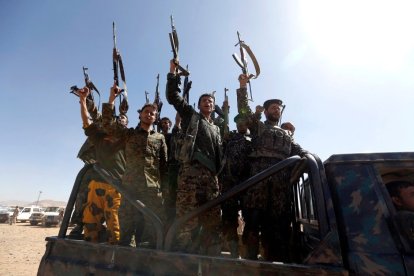Shooting themselves in the foot: Houthis attack a ship heading to Iran
The ship was carrying grain to the Islamic Republic, whose government is the main benefactor of Yemen's rebel group.

Rebeldes hutíes en imagen / Mohammed Huwaisafp - AFP
A Greek-owned, Marshall Islands-flagged ship sailing through the Red Sea was attacked by Yemen's Houthi rebels on Tuesday, the AP reported. The ship was transporting a shipment of grain destined for Iran, the main benefactor of the Yemeni terrorist organization .
This week's attack adds to a long series of Houthi offensives against ships in the Red Sea, which aim to put pressure on Israel and the West in the context of the war in Gaza. However, as trade has dramatically decreased in this maritime corridor following attacks by the rebel group, terrorists have bombed ships linked to Iran and the economic lifelines of the Islamic Republic: China and Russia.
A statement issued by French naval forces based in the United Arab Emirates indicated that the ship was on its way to Iran. It added that a team from Djibouti inspected the damage caused by the attack, which was carried out with drones and missiles.
Photos released by the French naval forces showed damage to both the ship's waterline and its deck.
According to the private security company LSS-SAPU, the attack lasted several hours, and there was no prior warning from the Houthis. The firm added that it had three armed security guards on board at the time of the bombing. Likewise, the Philippine Department of Migrant Workers said that the ship's crew was made up of 13 Filipinos and one Ukrainian.
More than 50 terrorist attacks in recent months
The Houthis have increased their attacks in the Red Sea and the Gulf of Aden, demanding that Israel end the war in Gaza against the Hamas terrorist group. Yemeni rebels have launched more than 50 offensives against ships since November, killing three sailors, capturing one vessel and sinking another, the U.S. Maritime Administration said.
This Wednesday, an American drone apparently crashed in Yemen. The Houthis claimed they managed to shoot it down with a surface-to-air missile. The U.S. Air Force did not report any aircraft missing, so it is likely that it was operated by the CIA.
Who are the Houthis?
The Houthi movement, also called Ansarallah (Supporters of God), is one of the sides in the Yemeni civil war, which emerged in the 1990s, when Hussein Al-Houthi founded the Young Believers, a religious revival movement of the centuries-old sect of Zaidis who ruled Yemen for centuries but were marginalized when the Sunni regime came to power after the 1962 civil war. The Al-Houthi movement was founded to represent the Zaidis and resist the Sunnism of the Wahhabis of Saudi Arabia. Its followers became known as Houthis and are currently considered to be armed and trained by Iran.
Ali Abdullah Saleh, president of Yemen after the unification of North and South Yemen in 1990, supported the Young Believers until factional confrontation made them a threat to him. But in 2003, when Saleh supported the U.S. invasion of Iraq, the Young Believers objected and the relationship reached a point of no return which, for Al-Houthi, was an opportunity to organize mass demonstrations. After months of violence Saleh issued an order for his arrest and Al-Houthi was killed in September 2004 by Yemeni forces, but his movement lives on.
The Houthi militia grew as more and more young people joined the cause in the first Arab Spring protests in 2011, calling for an end to Saleh's regime. They attacked again in 2014, taking control of parts of Sana'a, Yemen's capital, and stormed the Yemeni Presidential Palace in 2015, when they attempted to seize full power, taking advantage of popular discontent over the government's decision to end fuel subsidies. They quickly seized the Red Sea port of Hodeidah, dissolved the Yemeni Parliament, and formed a Revolutionary Committee to establish a de facto system of self-government. President Hadi fled to Saudi Arabia from where he launched a war against the Houthis that took on a regional tone as that country and the United Arab Emirates joined him in a coalition to return Al Hadi to power.
Although the coalition outgunned them, fast planes and tanks failed to dislodge the Houthis who aligned themselves with Iran. With small boats, they smuggled weapons, including ballistic missiles and drones that were used in several high-profile attacks in Saudi Arabia itself. But the Saudis had internal disputes, and the conflict in the area translated into a stalemate in the conflict. The Houthis, however, began coordinating with other pro-Iran terrorist groups. In 2018, an offensive by the coalition and the Yemeni government was about to tip the balance with U.N. approval, but inexplicably, the Houthis were left in control of the western coast, and they were able to continue receiving weapons from Iran.
RECOMMENDATION





















